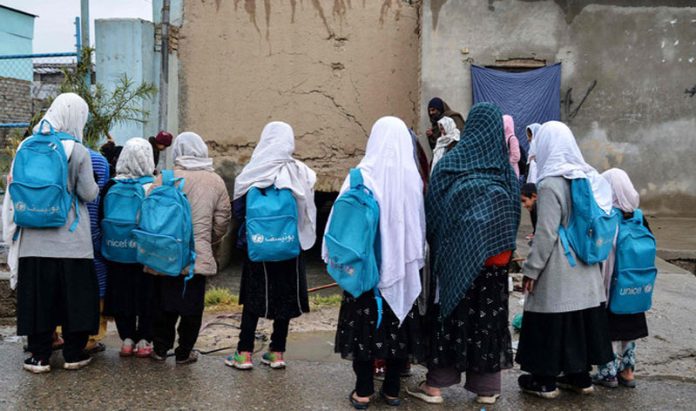UNITED NATIONS, Feb 27: More than two-thirds of the U.N. Security Council’s members demanded Monday that the Taliban rescind all policies and decrees oppressing and discriminating against women and girls, including banning girls education above the sixth grade and women’s right to work and move freely.
A statement by 11 of the 15 council members condemned the Taliban’s repression of women and girls since they took power in August 2021, and again insisted on their equal participation in public, political, economic, cultural and social life — especially at all decision-making levels seeking to advance international engagement with Afghanistan’s de facto rulers.
Guyana’s U.N. Ambassador Carolyn Rodrigues-Birkett read the statement, surrounding by ambassadors of the 10 other countries, before a closed council meeting on U.N. Secretary-General Antonio Guterres’ conference with more than 25 envoys to Afghanistan on Feb. 18-19 in Qatar’s capital, Doha.
Afghan civil society representatives, including women, participated in the Doha meeting, which the council members welcomed. The Taliban refused to attend, its Foreign Ministry saying in a statement that its participation would be “beneficial” only if it was the sole and official representative for the country at the talks.
While the Taliban did not attend the meetings, U.N. Political chief Rosemary DiCarlo did meet with Taliban officials based in Doha, U.N. Spokesman Stephane Dujarric said. DiCarlo also briefed council members at Monday’s closed meeting.
The Taliban have not been recognized by any country, and the U.N. Envoy for Afghanistan last year warned the de facto rulers that international recognition as the country’s legitimate government will remain “nearly impossible” unless they lift the restrictions on women.
The 11 council nations supporting the statement — Ecuador, France, Guyana, Japan, Malta, Sierra Leone, Slovenia, South Korea, Switzerland, United Kingdom and United States – underscored that there can only be sustainable peace in Afghanistan if its political process is inclusive and the human rights of all Afghans are respected including women and girls.
Four Security Council nations didn’t sign on to the statement – Russia, China, Mozambique and Algeria.
The Taliban refused to attend the Doha meeting. A Foreign Ministry statement said participation would only be beneficial if the Islamic Emirate of Afghanistan, as the Taliban call their administration, are the sole and official representative for the country at the talks.
Secretary-General Guterres told reporters in Doha that among participants — also including representatives of the European Union, the Organization of Islamic Cooperation and the Shanghai Cooperation Organization — there was “total consensus” on requirements for Afghanistan to be integrated into the international community.
To reach this “endgame,” he said, Afghanistan must not be “the hotbed of terrorist activities that impact other countries,” its institutions must include diverse groups including Uzbeks, Tajiks, Pashtuns and Hazaras, and human rights must be respected especially the rights of women and girls.
Guterres said to a certain extent there is currently “a kind of situation of the chicken and the egg.”
“On one hand, Afghanistan remains with a government that is not recognized internationally and, in many aspects, not integrated in the global institutions and in the global economy,” he said. “And on the other hand, there is in the international community a perception that inclusivity has not improved; that the situation of women and girls and human rights in general has in fact deteriorated in recent times.”
The secretary-general said one objective of the meeting with the envoys was “to overcome this deadlock” and develop a roadmap in which the international community’s concerns and the Taliban’s concerns are “taken into account simultaneously.”
A Security Council resolution asked Guterres to appoint a U.N. Envoy after consultations with all parties, member states, the Taliban and others.
Guterres said the participants decided he should initiate consultations “to see if there are conditions to create a U.N. Envoy that might be able not only to have a coordinating role in relation to the engagements that are taking place but that can also work effectively with the de facto authorities of Afghanistan.”
“I will initiate immediately those consultations,” the U.N. Chief said. (AP)
Home International Most UN Security Council members demand Taliban rescind decrees seriously oppressing women...


